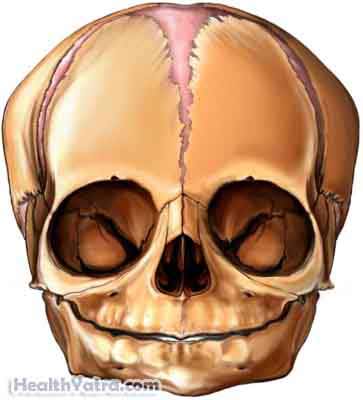Definition
Crouzon syndrome is a genetic disorder. It results in abnormal joining of the bones in the skull and face.
Infants have sutures between the bones in the face and skull. As an infant’s brain grows, these sutures allow the skull to expand. These sutures fuse together once we are adults since our skulls and brains are done growing.
In Crouzon syndrome, the bones in the skull and face fuse too early. The skull is then forced to grow in the direction of the remaining open sutures. This causes an abnormally shaped head, face, and teeth.

Causes
Crouzon syndrome is caused by a defect in a specific gene. It is not clear what causes this gene to mutate. Some may be inherited from parents genes.
Risk Factors
Factors that may increase your child’s risk of Crouzon syndrome include having:
- Parents with the disorder
- Parents who do not have the disorder, but who carry the gene that causes the disorder.
- Fathers at an older age at the time of conception
Symptoms
The main signs and symptoms of Crouzon syndrome include:
- Flattened top and back of head
- Flattened forehead and temples
- Mid-face that is small and located further back in the face than normal
- Beaked-like nose
- Compression of nasal passages, often causing reduced airflow through the nose
- Large, protruding lower jaw
- Misalignment of teeth
- High-arched, narrow palate, or cleft palate
Other symptoms and complications that can result from Crouzon syndrome include:
- Problems with development of inner ear and hearing loss
- Meniere’s disease (dizziness, vertigo, or ringing in the ears)
- Problems with the eyes including vision problems, crossed eyes or involuntary eye movement
- Curvature of the spine
- Headaches
- Acanthosis nigricans (small, dark, velvety patches of skin)
- Hydrocephalus—build up of fluid in the skull
Diagnosis
A doctor can usually diagnose Crouzon syndrome based on physical signs and symptoms.
The doctor may need images of the skull. These can be taken with:
- X-rays
- MRI scan
- CT scan
Your doctor may also do genetic testing to confirm the diagnosis.
Treatment
There is no cure yet for Crouzon syndrome. Currently, many of the symptoms can be treated with surgery.
Treatment may include:
Surgery
There are a number of surgeries used to treat the symptoms of Crouzon syndrome. These include:
- Craniectomy—removal and replacement of portions of the skull. Done as early as possible after birth to prevent damage to the brain. It will also help to maintain a skull shape that is as normal as possible.
- Surgery to treat protrusion of one or both eyeballs—adjustments are made to the bones surrounding the eye sockets.
- Surgery to treat protruding lower jaw—to normalize the appearance of the jaw.
- Surgery to repair a cleft palate.
Orthodontic Treatment
Orthodontic treatment can help correct the alignment of teeth. It may include braces.
Eye and Ear Treatment
Specialist should monitor infants and children with Crouzon syndrome. These specialists can check for eye and ear problems and treat as necessary.
Supportive Treatment
Children with a mental deficiency or intellectual disability may need special education help.
Prevention
There is no known way to prevent Crouzon syndrome. If you have Crouzon syndrome or have a family history of the disorder, you can talk to a genetic counselor when deciding to have children.
